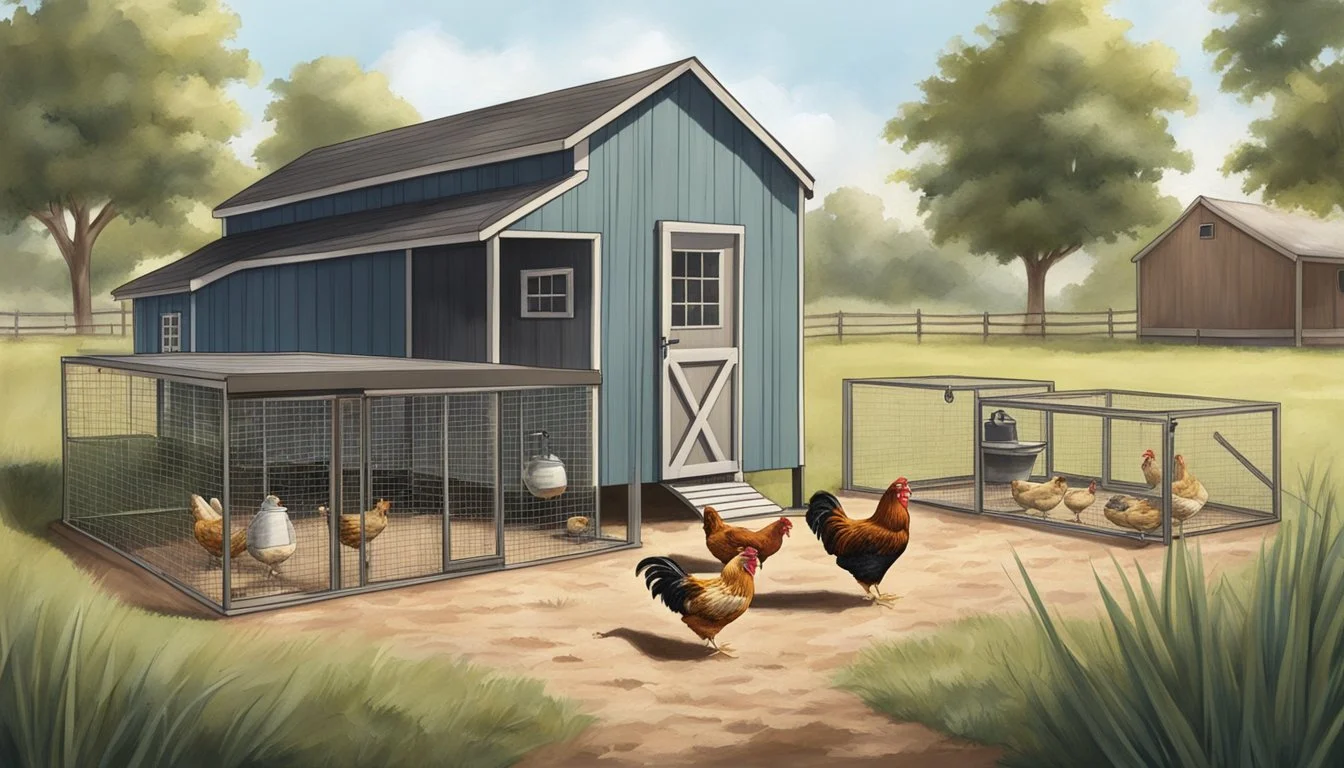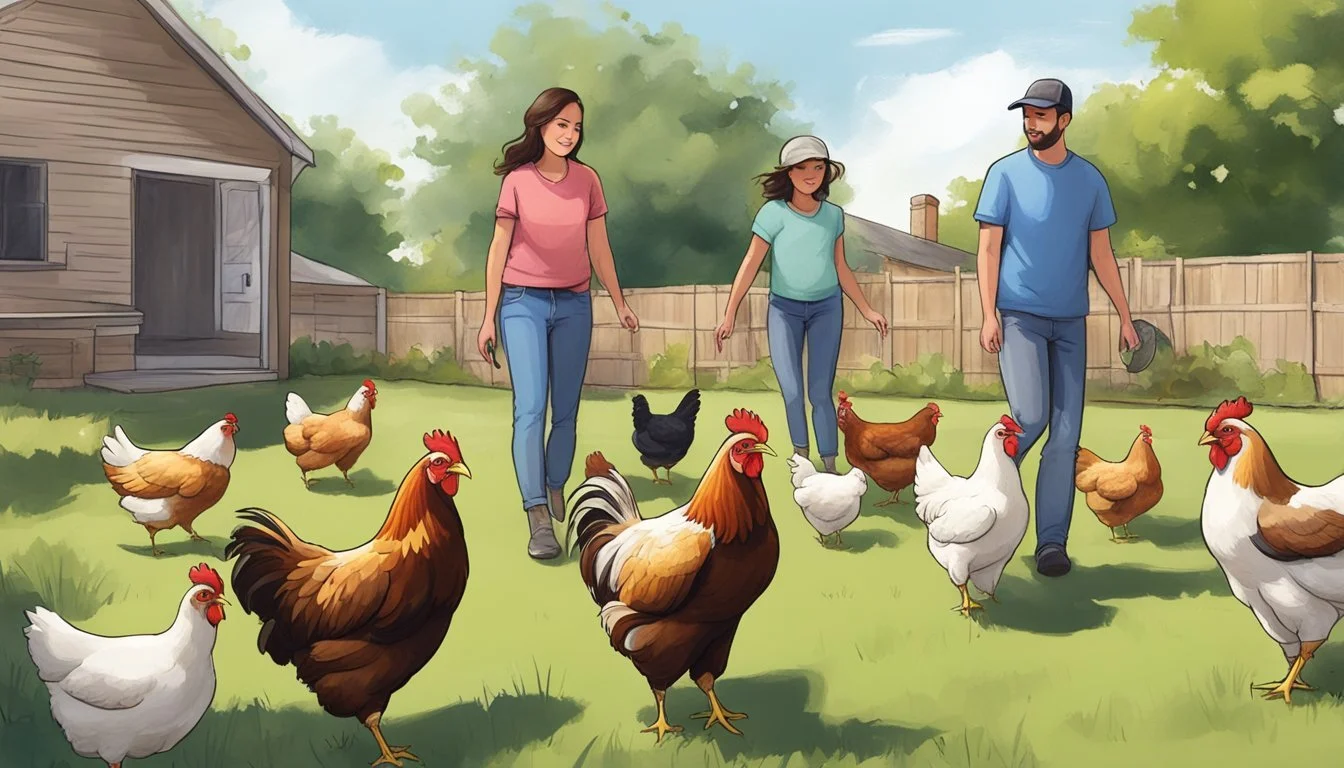Keeping Backyard Chickens in Wichita Falls, TX
Essential Guidelines for Beginners
In Wichita Falls, Texas, the rise of urban farming has led to a growing interest in keeping backyard chickens. Residents are recognizing the benefits of having a ready supply of fresh eggs, reduced food waste through chicken feed, and the joy of caring for these animals. With these advantages, many are turning their attention to local ordinances to understand how they might join the urban poultry movement.
The City of Wichita Falls has specific guidelines in place for residents who wish to keep chickens. According to the Code of Ordinances, a fowl permit is necessary for anyone looking to keep these birds within city limits. Furthermore, there are clear requirements regarding the amount of space needed per chicken and the distance that chicken enclosures must be kept from neighboring residences. These rules ensure the welfare of the chickens while also considering the rights and concerns of fellow community members.
As Texans navigate the complexities of urban agriculture, it is essential for potential chicken keepers in Wichita Falls to be well-informed about their responsibilities. Adherence to city regulations helps to maintain a harmonious balance between human and animal residents, safeguarding public health and the interests of all parties involved. As the interest in backyard chickens continues to grow, understanding these local laws is the first step to successfully raising chickens in Wichita Falls.
Understanding Local Chicken Ordinances in Wichita Falls
Keeping backyard chickens in Wichita Falls, TX requires residents to be familiar with specific local ordinances. Compliance with these regulations ensures that poultry enthusiasts can legally maintain their flocks within city limits.
City Council and Municipal Regulations
The City of Wichita Falls has established ordinances that govern the keeping of backyard chickens. These regulations are in place to maintain public health, safety, and community standards. The Chicken Laws and Ordinances can be accessed through the city's official website or by contacting the City Clerk's office for detailed information.
Distance Restrictions and Relevant Laws
Backyard chicken coops in Wichita Falls must adhere to distance restrictions. Coops are required to be at least 20 feet away from neighboring residences. Additionally, coops must be designed to prevent the escape of chickens and protect them from predators. Laws also stipulate that they should be screened from view to maintain the aesthetics of the neighborhood.
Permits and Permitting Process
Individuals looking to keep chickens must navigate the permitting process. A permit is required, and the city may limit the maximum number of chickens allowed per household. Residents must apply for the permit through the relevant city department, and approval is contingent upon meeting all the stipulated requirements. Roosters may be allowed, but typically only on properties that are at least 10,000 square feet.
Residents should always check for updates to local regulations in case of changes in the law or additional requirements.
Setting Up Your Chicken Enclosure
When planning to keep chickens in Wichita Falls, TX, adhering to local ordinances is crucial, and creating a secure and appropriately-sized enclosure stands paramount to your livestock's well-being.
Choosing the Right Location
The location of your chicken enclosure must comply with Wichita Falls regulations, mandating a minimum of 75 feet distance from any residence, except that of the owner. The chosen area should offer ample sunlight, shade, and protection from harsh weather.
Coop Design and Size Considerations
Coops in Wichita Falls need adequate space, with a recommendation of 12 square feet per chicken to prevent overcrowding and promote health. Key components include:
Nesting Boxes: One for every 3-4 hens.
Roosts: Provide enough space for all chickens to roost comfortably.
These considerations support hygiene and prevent the outbreak of diseases among the flock.
Protecting Against Predators and Disease
An enclosure should:
Be secured against predators with sturdy materials and proper fencing.
Include regular cleaning schedules to prevent disease.
Frequent inspection and maintenance of the coop are necessary to ensure a safe environment for raising chickens.
Chicken Care and Management
In Wichita Falls, TX, responsible chicken care and management are essential for maintaining a healthy and productive backyard flock. Striking a balance between daily attention and consistent routines is key to their well-being.
Daily Feeding and Maintenance
Chickens require a balanced diet to stay healthy. Feeding schedules should align with their growth stages: chicks necessitate a high-protein starter feed, while adults thrive on layer pellets. Fresh water must be accessible at all times. Coop cleaning is a daily task to prevent disease and pest infestations. Bedding should be kept dry and changed regularly to ensure a clean environment.
Age Group Feed Type Protein Content 0-8 weeks Starter feed 18-20% 8-14 weeks Starter/Grower feed 16-18% 15-18 weeks Finisher feed 16% Adults Layer feed Varied based on brand
Health Monitoring and Veterinary Care
Routine health checks are crucial to detect and address issues early. Owners should observe their fowl for any signs of illness, such as lethargy, respiratory distress, or changes in appetite. Vaccinations and deworming are preventive measures to keep chickens free from common ailments. A local veterinarian with poultry experience can provide necessary treatments and health advice specific to the needs of backyard chickens in Wichita Falls.
Managing Waste and Preventing Flies
Efficient waste management is vital to prevent odor build-up and fly problems. Regularly removing droppings and turning over the soil or bedding helps minimize fly attraction. Composting chicken manure creates a nutrient-rich addition for gardens, while proper disposal keeps the yard hygienic.
Waste Removal: Daily
Bedding Replacement: Weekly
Composting: As needed
Utilizing covered waste bins and maintaining dry conditions in the coop also contribute to effective fly control.
Legal and Social Considerations
Navigating the complex landscape of backyard chicken keeping in Wichita Falls, TX, requires an awareness of local ordinances and sensitivity to community standards. The following subsections outline the legal framework and social dynamics that residents need to consider.
Navigating Neighbor Relations
Residents must be considerate of their neighbors when keeping chickens. The City of Wichita Falls mandates a minimum distance of 75 feet from any chicken enclosure to neighboring residences, excluding the owner's residence. This regulation is in place to prevent issues such as odors, noises, and potential health concerns which could arise from close proximity to other homes.
Understanding Penalties for Violations
In Wichita Falls, failure to comply with fowl regulations can lead to penalties. While specific fines are not detailed in the search results, residents can anticipate fines if they exceed the allowed number of chickens or if their enclosures are too close to neighboring properties, including homes, schools, and churches within residential areas.
Role of Homeowner Associations
Homeowner associations (HOAs) may have additional regulations regarding backyard chickens. Their rules can include fees for permits, restrictions on the number of chickens, and stricter enclosure requirements. Members of an HOA should review their association's covenants to ensure they are not in violation, as penalties can be levied for non-compliance.
Additional Fowl and Livestock Considerations
When examining the regulatory landscape for keeping backyard chickens in Wichita Falls, Texas, it is crucial to compare other fowl and livestock rules and consider their impact on urban planning and zoning.
Comparing Rules for Other Fowl and Livestock
In Wichita Falls, the ordinance concerning chickens requires an Animal Maintenance Permit for anyone keeping more than three chickens or other fowl. The city has specific prohibitions that are important for residents to be aware of:
Roosters are not permitted within city limits to prevent noise disturbances.
Guinea cocks, peafowl, and geese are similarly restricted due to noise.
Livestock such as horses, sheep, and goats may be subject to different regulations, often involving larger space requirements and zoning considerations.
Residents interested in keeping livestock animals must ensure that they are not allowed to roam free, as this can lead to legal complications and penalties.
Impact on Urban Planning and Zoning
Local chicken laws and regulations for other livestock in urban areas such as Wichita Falls are not isolated rules but part of a broader consideration of urban planning and zoning. Urban chicken raising must be balanced with community aesthetics, sanitation, property values, and neighborly relations.
For example, enclosures for fowl must not be nearer than 75 feet to any residence, excluding the residence of the harborer. This is to minimize odors, noise, and potential health issues from proximity to animals. In terms of zoning, residential areas may have certain parcels classified for urban agriculture or livestock purposes, while others will be strictly residential.
This careful planning ensures that the practice of raising chickens and other animals does not negatively impact the urban environment, helping to maintain a safe and beautiful community for all residents.
Comparative Study: Wichita Falls vs. Other Cities
In Texas, urban chicken-keeping laws vary considerably from one municipality to another, reflecting a broader national trend towards urban agriculture. Both state and national regulations highlight the complexity and diversity of urban chicken-keeping ordinances.
Chicken Keeping Laws in Texas Cities
Wichita Falls: Residents are allowed to keep chickens, but they must adhere to specific local ordinances. For instance, to raise chickens in Wichita Falls, one must ensure that the information on ordinances is up-to-date and accurate, as local laws change periodically.
Dallas: Dallas permits the keeping of chickens in the city, but they must be kept a certain distance from neighboring residences. Roosters are often prohibited due to noise concerns.
Plano: Similar to Dallas, Plano regulates the distance that chicken coops can be located from homes and prohibits roosters in residential areas to maintain noise levels.
Fort Worth & Arlington: These cities have their regulations regarding chicken keeping, with Fort Worth allowing a limited number of chickens without a permit, and Arlington having more stringent rules and space requirements.
Austin: Recognized for its progressive stance on urban agriculture, Austin permits chicken keeping and encourages residents to maintain backyard flocks in line with sustainable living practices.
San Antonio: As one of the largest cities in Texas, San Antonio requires residents to adhere to specific regulations that include coop specifications and placement requirements to minimize nuisances.
Houston & Laredo: These cities have various restrictions on the number of chickens that can be kept and coop placement relative to other buildings. Licensing or permits might be necessary.
National Trends in Urban Chicken Regulations
Across the United States, municipalities present a patchwork of chicken-keeping regulations, reflecting diverse community standards and health concerns.
Sachse & Garland, TX: Both cities have crafted unique regulations that demonstrate the local autonomy Texas cities have in determining their urban agriculture policies.
USA: Nationwide, trends indicate that chicken keeping in urban settings is gaining popularity, subject to municipal codes designed to protect public health and community well-being. Regulations often address potential issues related to noise, waste management, and disease control.
Urban chicken regulations serve as a testament to the balancing act cities perform between encouraging local food production and maintaining public health and safety standards.






